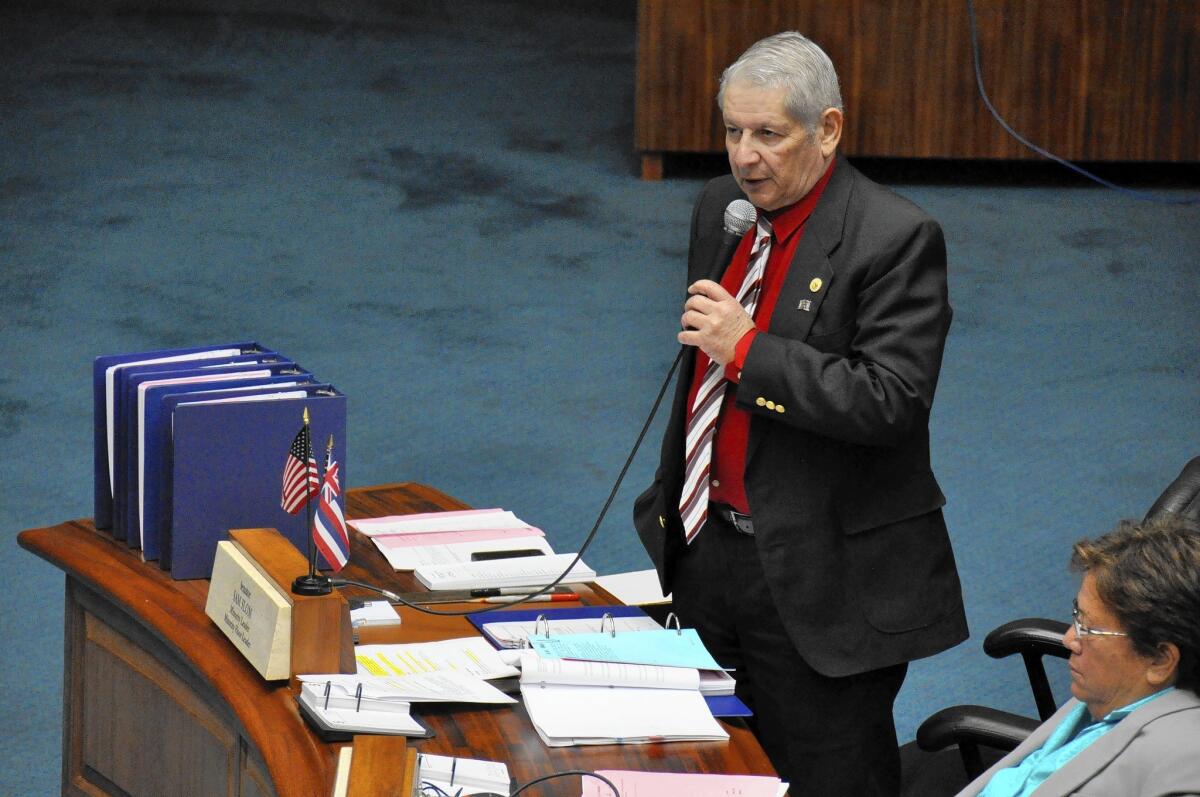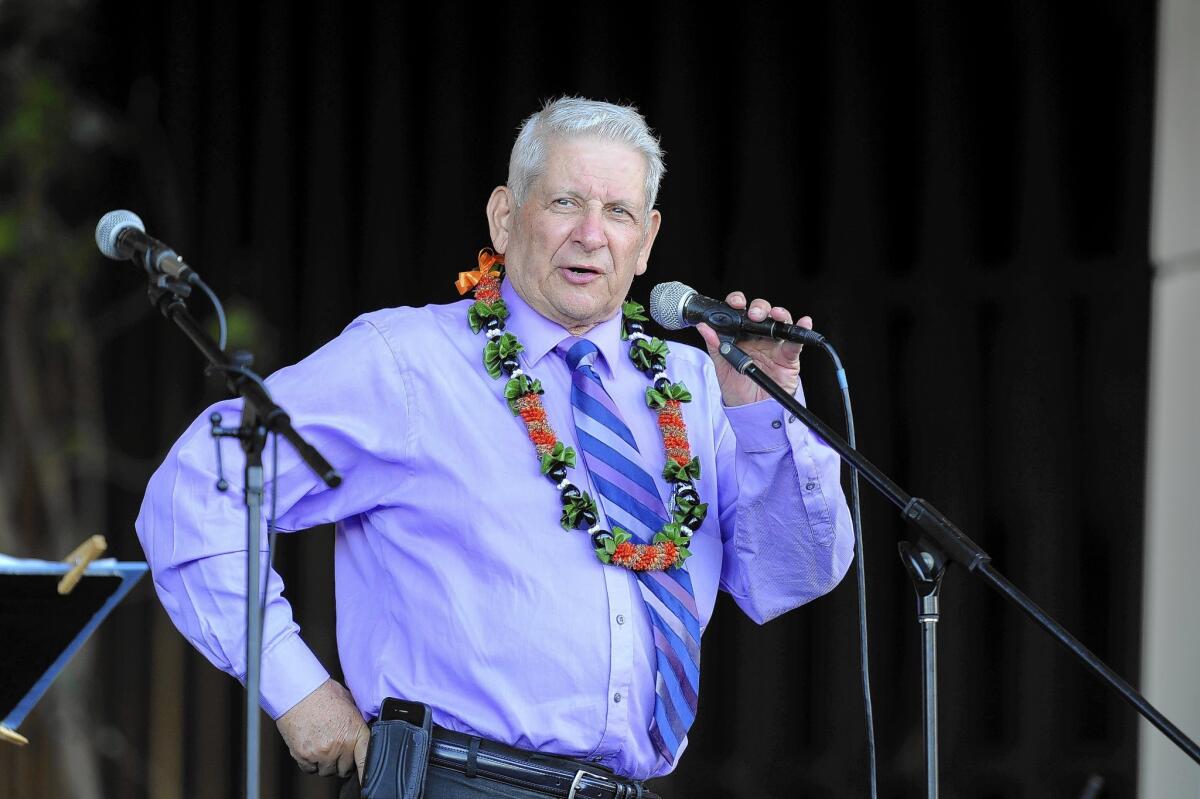Sam Slom, party of one in Hawaii’s Senate
As the lone Republican in Hawaii’s Senate, Sam Slom is undaunted despite being hopelessly outnumbered.
- Share via
HONOLULU — The clock was ticking and scores of bills hung in the balance, so Hawaii's Republican Senate caucus descended to the Capitol basement and an austere wood-paneled meeting room, sealing the door to plot strategy.
Peering from behind silver reading glasses, Minority Leader Sam Slom skimmed a summary of each bill, then rendered a verdict. A housing revenue bond: "That's OK." Funds to boost Hawaii's film industry: "We'll let that one go." Guaranteed overtime for public works: "More cost to the taxpayer," Slom said, flagging the bill for dissent on the Senate floor.
The room was filled with a dozen staffers as well as the minority leader, the GOP floor leader and the top-ranking Republican on each of 16 committees, yet in 21/2 hours there wasn't a whisper of dissent as Slom firmly made up his mind.
That's because Slom holds every one of those leadership positions.
In the 25-member Hawaii Senate there are 24 Democrats and one Republican: Slom, a Pennsylvania-born contrarian with a frugal streak owing to his parents' Great Depression upbringing and an unyielding capacity to be clobbered — ceaselessly, day in, day out — and gladly return for more.
"Nobody twisted my arm," he said. "Nobody's making me stay."
Other legislatures are lopsided. Until recently, California Democrats held a two-thirds majority in Sacramento. Rhode Island Democrats control the state House 69 to 6 and Wyoming Republicans command the state Senate 26 to 4.
But Slom — the pronunciation rhymes with "home" — is a figure of unique solitude, comprising the only single-member caucus anywhere in the country. Even Hawaii's House of Representatives has seven Republicans among its 51 members.
The opportunities for futility are never-ending. Forget about passing legislation. Slom's policy proposals are largely ignored and his amendments rejected. Ideas that gain favor are swiped by Democrats, without giving him credit. He joked about holding "every indoor and outdoor NCAA record in voting no" — usually on the black-and-blue side of a 24-1 thumping.
Yet success, however meager, can be measured in different ways. "Who stands up for free enterprise ... for no need for new taxation?" Slom asked as a lunch of pizza and salad sat untouched. "That's what keeps me here, to make sure that people understand there is a different philosophy, that it's an important philosophy, that it's practiced in many states across this country."
He has an ideology, but he’s not an ideologue.”— Gov. Neil Abercrombie
Hawaii is one of the most thoroughly Democratic states in the U.S., a product of its multiracial culture and strong labor influence, but Slom, 72, is surprisingly well-regarded. Part of it may be the indulgence afforded an eccentric, and mostly harmless, uncle. But political opponents praised his principle and consistency, his thorough research and carefully reasoned arguments. (Some Democrats agree with Slom more than they publicly admit.)
"He has an ideology, but he's not an ideologue," said Democratic Gov. Neil Abercrombie, who has known Slom since they attended the University of Hawaii and stood on opposite sides of the Vietnam War — Slom marching in favor, Abercrombie against. "You can always have a civilized conversation."
A sense of humor helps. In 2010, Hawaii's only other Republican senator retired and was replaced by a Democrat. People took to calling Slom "the Lone Ranger." So on the Legislature's 2011 opening day, Slom delivered his speech for the minority caucus wearing a black cowboy hat and carrying a little stick pony.

Slom never worried much about standing out.
In the dead of an Allentown, Pa., winter, he'd wear the aloha shirts with little coconut buttons that his Uncle Ray, a sailor, sent from Honolulu. For as long as he can remember, Slom was drawn to the islands. He followed the 1950s debate on statehood and tuned in each Sunday night to the live-music show "Hawaii Calls." (Abercrombie grew up listening to the radio broadcast in Buffalo, N.Y.)

Slom harbors no illusions about passing legislation in the Democratic-controlled Senate. Instead he sees his role as standing up for free enterprise and against new taxation. “That’s what keeps me here, to make sure that people understand there is a different philosophy, that it’s an important philosophy, that it’s practiced in many states across this country,” he says. (Jamm Aquino, Honolulu Star-Advertiser)
Slom's parents expected him to accept a scholarship to the University of Pennsylvania; instead he used his savings and bought a ticket to Honolulu, announcing the departure at his Hawaiian-themed high school graduation party. His mother, he said, dropped a tray of hors d'oeuvres.
After college and law school, Slom started a Honolulu economic consulting firm, which he still runs. He became a familiar face during the Legislature's 60-day sessions, lobbying for small-business interests until he grew convinced he could do more as a lawmaker. In 1996, Slom knocked off a 22-year Democratic incumbent to nab a Senate seat, representing Diamond Head and other affluent parts of east Oahu.
He described his politics this way: "Conservative first. Libertarian second. Republican." He supports legalized abortion, decriminalizing marijuana and civil unions for gay couples — but not same-sex marriage — and suggests the GOP has better things to do than crusade on social issues.
His main interest is fiscal matters. He has never, he boasted, voted for a tax increase and never will. (He's personally frugal too, routinely turning back a portion of his office allowance and driving extra blocks to hunt down the cheapest gas for his 2005 Saturn.)
Married and twice divorced, Slom has four grown sons who live on the mainland, which leaves plenty of time for other interests: snorkeling, reading historical and business biographies, and extending a thumb in the eye of the reigning Democratic establishment.

Hawaii's Senate chamber is cone-shaped, evoking a volcano, and swimming in oceanic blues and greens, a fitting color scheme for proceedings that move with the sureness of the tides.
Democratic lawmakers stared at computer screens or sifted paperwork as the Senate president read a bill number. Slom lifted his left hand. "I rise in opposition," he said. "Proceed," the president replied. Slom offered his objections: more taxes, more spending, more bureaucracy. "Further discussion?" the president asked. Hearing none, the vote was announced: 24-1 approval.

Inside the Hawaii Senate chamber in Honolulu. (Bruce Asato, Honolulu Star-Advertiser)
The ritual played out nearly three dozen times, the only variation being the occasional bill passed with 23 votes. (Others were approved unanimously.) Afterward, Slom's only disappointment was the lack of debate clarifying why lawmakers voted the way they did. "Today was all about haste," he said.
Slom has a near-fetish for transparency and accessibility. He refuses to ride the members-only elevators and makes his cellphone number public, putting up with drunk-dialers, political harangues, even anti-Semitic rants. The one thing Slom won't abide is mispronunciation of his name. "The only thing my dad left me," he said.
In turn, he avoids meanness and personal attacks, Slom said, though that doesn't always ring true. At one point he likened the intelligence of Hawaii's U.S. Sen. Mazie Hirono to the paneling in the GOP caucus room. At another, he referred to the death of President Obama's white grandmother, Madelyn Dunham, just before the 2008 election as payback for her portrayal in the campaign. (Slom worked with Dunham at the Bank of Hawaii, admired her and said Obama wrongly depicted her as racist.)
When I walk into a room, I bring 100% of the minority with me.”— Sam Slom
Last year he stirred controversy by telling Fox's Bill O'Reilly that Hawaiian lawmakers were soft on sex offenders because of an "underlying cultural problem" that condones sex with children. The outrage left him unmoved; second-guessing is not a conspicuous part of Slom's nature. He regrets "some of the dumb things I've said over the years" but allowed as how he would "probably say them again. I believe in them."
On fiscal matters, at least, some of what he says resonates with Democrats who echo Slom's contention that Hawaii's government is bloated and its welfare programs too expensive. But they said so privately. One Senate leader spoke well of Slom and then asked, twice, not to be quoted as seeming too kind. The tug of political allegiance is strong.
As a party of one, Slom needn't worry. "When I walk into a room," he said, smiling, "I bring 100% of the minority with me."


Slom, the lone Republican member, speaks in the Senate chamber. He voted against a proposal to raise the minimum wage, saying it would lead to higher unemployment. (Anita Hofschneider, Associated Press)
On a Friday, Slom was doing his usual scramble, toting his "binder of life," which breaks down the daily Senate schedule to spread him as widely as possible. When committees meet simultaneously — around the corner for tourism, down two levels to judiciary and labor — he deploys aides to alert him electronically or grab him when a particular issue arises.
His office, overlooking the busy streets surrounding the Capitol, is filled with GOP totems: elephants and don't-tread-on-me flags; Adam Smith's "Wealth of Nations"; and Ronald Reagan, grinning from the cover of a biography. On this day it was decorated with balloons and streamers; Slom's birthday was Sunday and staffers brought cake and ice cream to celebrate.
Back from an oversight hearing, he bantered a few moments — "Boy, they have some slippery characters in that Department of Taxation" — then abruptly broke up the party. "OK, guys," Slom cheerfully barked, "we got a session to do."
With that, the Lone Ranger rode off again.
Follow Mark Z. Barabak (@markzbarabak ) on Twitter
Follow @latgreatreads on Twitter
More great reads
Burglars live the high life off rooftop bank heists

None of them worked and they were living the high life. They had all the toys.”
Sign up for Essential California
The most important California stories and recommendations in your inbox every morning.
You may occasionally receive promotional content from the Los Angeles Times.











